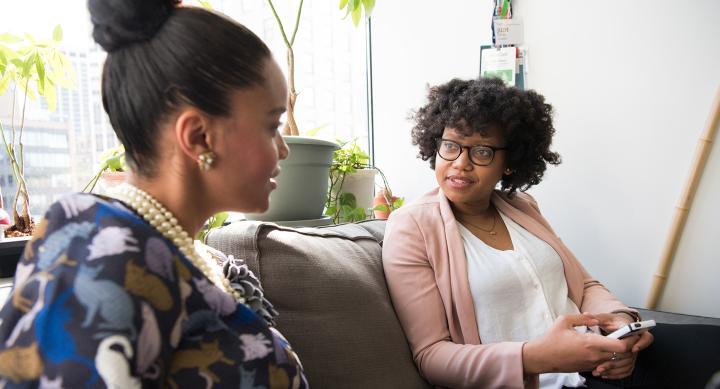
African American Mental Health and Wellness (AMEN) team is collaborating with KAZI FM 88.7 in producing a radio series to highlight the importance of addressing mental health and physical wellness in the African American community. The monthly series will feature AMEN team members from the School of Nursing, leaders from Mt. Zion Baptist and Rehoboth Baptist churches, and community organizations who provide mental health resources and support in Travis county.
Episode 18: Levels of Mental Health Care: When to Seek Help and Support for Those Around Us
Moderator, Jacki Hecht, interviewed Jhana Rice, Licensed Professional Counselor, Licensed Chemical Dependency Counselor-Intern, Counselor in Behavioral Health and Resource Navigation at Ascension Seton and Tenisha Hunter, Licensed Clinical Social Worker, Resource Navigator and Behavioral Health Counselor at Ascension Seton.
Jhana Rice describes the various different “levels of care” in mental health that range from inpatient care, which is critical care designed for individuals contemplating hurting themselves or others, all the way to support groups which are a more informal, but important way of seeking help. Rice adds that support groups are effective because individuals feel less alone when they are “around others who are struggling or walking through similar things.” Although it can be intimidating for someone to reach out and seek help, building mental health resilience is crucial for one’s overall state of well-being. Tanisha Hunter adds that African Americans have historically required higher and more urgent levels of care because many individuals aren’t aware of the different options for support.
There are many steps one can take to strengthen mental health and well-being. However, the most significant measure of preventive care and managing distress is recognizing that additional help and support is needed. Rice and Hunter suggest that having a conversation and maintaining an individual’s autonomy are crucial for their roles as counselors because it is important to find an intervention and level of care that is best suited for the person in need of help.
Rice and Hunter also add that “nothing formal needs to happen” to reach out to a mental health provider. Anyone can reach out for help when feeling overwhelmed or uncertain that they can manage on their own. Furthermore, many people seek mental health assistance more than once in their lifetime, which is often a sign of commitment to feeling better. However, many people mistakenly view this as a weakness and fear having to seek help multiple times. This is remarkable because it is an important strength to recognize changes in mood and behaviors and get extra support when needed. Jacki Hecht notes that this reframing of the way people view getting help is a “sign of self-awareness and self-strength” rather than a vulnerability or weakness. As we continue to interact with people during difficult times, it is important to remember that compassion and love are our best tools. Being there for someone in a caring, empathic way, and letting them know their voice is being heard is significant enough to save a life.
Ascension Seton's Behavioral Health: If you or someone you love is struggling with behavioral or mental health issues, Ascension Seton's Behavioral Health teams can help. Our Behavioral Health Navigators are clinicians trained to assist you in finding a therapist, psychiatrist, support group or other resources to deal with the challenges you may be facing. Please call Ascension Seton’s Behavioral Health at 512-324-2039.
Learn more about AMEN podcast and check out other episodes!
Visit AMEN Podcast Resources.

